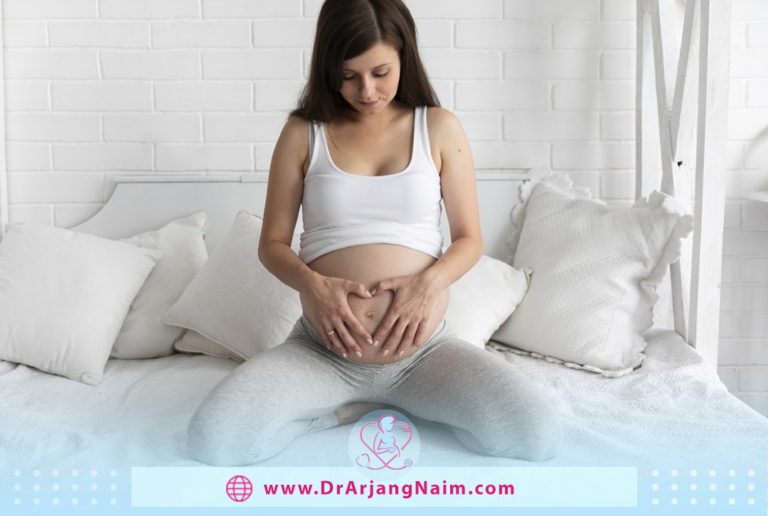Urinary retention is a condition in which you are unable to completely empty your bladder during pregnancy. Pregnancy is a journey of incredible change. While you welcome the little miracle growing inside, your body works overtime to accommodate it. One unexpected hurdle you might encounter is urinary retention, the inability to empty your bladder. While not especially common, it can occur at any point during pregnancy, but it’s most frequent in the first trimester, between 9 and 16 weeks.
Symptoms of urinary retention in pregnancy
Urinary retention during pregnancy can be a confusing issue because frequent urination is also a typical pregnancy symptom. Here’s how to tell the difference:
- Incomplete Emptying: This is the most common form of urinary retention in pregnancy. You might feel the urge to urinate frequently but only pass a small amount each time. You may also experience a feeling of fullness or discomfort in your lower abdomen even after urinating.
- Inability to Urinate: This is a more severe symptom and requires immediate medical attention. If you are unable to urinate at all, even when you feel a strong urge, seek medical help right away.
Other potential signs of urinary retention in pregnancy include:
- Lower abdominal pain or swelling: The pressure from a full bladder can cause pain and discomfort in your lower abdomen.
- Straining to urinate: You may feel like you have to push or strain to urinate, even if you only pass a small amount.
- Dribbling urine: You might experience urine leakage even though you feel the urge to urinate.
If you experience any of these symptoms during pregnancy, it’s important to see your doctor to rule out urinary retention and other potential causes. Early diagnosis and treatment can help prevent complications and ensure a healthy pregnancy.
Urinary retention or bladder retention means that you are unable to empty your bladder. In more severe cases, you may not be able to urinate even when you want to. Going to the toilet or urinating is a complex process involving coordination between the brain, body nerves, and spinal cord.
Sometimes, something prevents this process, and you cannot go to the toilet as usual. For example, blockages in the urinary tract or neurological problems can lead to urinary retention.
There are two forms of urinary retention (acute and chronic). Acute urinary retention occurs suddenly and can be life-threatening. In this situation, you feel a strong need to urinate, but you cannot go at all. This condition causes a lot of pain and discomfort in the lower abdomen. If you are experiencing acute urinary retention, you should get emergency medical attention right away to release the urine build-up.
With chronic urinary retention, the inability to release all the urine in the body over some time occurs. You may not even realize it is happening because there are no symptoms at first. If your urine stream is weak or starts and stops, you should talk to your doctor.
Causes of urinary retention in pregnancy
Though not especially common, urinary retention during pregnancy can be frustrating and uncomfortable. The good news is that it’s usually temporary and treatable. Several factors can contribute to urinary retention during pregnancy.
Growing uterus
As your baby grows, the uterus naturally expands, putting pressure on your bladder. This pressure can make it difficult for your bladder to empty completely when you urinate.
Hormonal changes
Pregnancy hormones, particularly progesterone, relax the muscles in your body, including those in your bladder. This relaxation can make it harder for the bladder to contract and expel all the urine.

Constipation
Constipation is a common complaint during pregnancy due to hormonal changes and the growing uterus pressing on your intestines. A full rectum can also put pressure on your bladder, making it difficult to empty.
Neurological issues
In rare cases, nerve damage in the pelvis can interfere with the signals between your bladder and brain, leading to urinary retention.
Blockage in the urethra
A blockage in the urethra, the tube that carries urine from your bladder to outside your body, can also cause urinary retention. This blockage can be caused by a kidney stone, blood clot, or pelvic organ prolapse (more common later in pregnancy).
If you are experiencing urinary retention during pregnancy, it’s important to see your doctor to determine the underlying cause and get appropriate treatment. Early diagnosis and treatment can help prevent complications such as urinary tract infections (UTIs) and kidney damage.
Risks associated with urinary retention
Aside from being annoying and uncomfortable, there are a number of risks associated with urinary retention. For example, not being able to urinate when needed can cause great discomfort. In addition, you will likely experience fullness and perhaps even pain in the pelvic area.
Bladder infection
You are also at increased risk of bladder infection. This is because urine stays in your bladder for a long time. This type of infection is called a urinary tract infection (UTI). If the infection spreads and involves the kidneys, it can become very serious.
A UTI can cause fever, chills, and even blood in the urine. In addition, the infection can spread throughout the body, potentially harming you and your baby. For example, a urinary tract infection can cause premature birth or low birth weight.
Miscarriage
Similarly, when the prolapsed uterus causes acute urinary retention, you are at risk of miscarriage. Therefore, if you are unable to urinate, you should see a doctor immediately.
Treatment options for urinary retention in pregnancy
The treatment options for urinary retention in pregnancy depend on the severity and underlying cause.
Catheterization
This is often the first line of defense, especially for acute urinary retention, where you can’t urinate. A thin tube is inserted into your bladder to drain the urine. There are two main types:
- Intermittent Catheterization: You learn to insert and remove the catheter yourself, allowing you to manage your bladder drainage at home.
- Indwelling Catheter: This catheter remains in place for a longer period, typically a few days, and is emptied by a healthcare professional.
Medication
Medications are used cautiously during pregnancy due to potential fetal risks. However, in some cases, your doctor may prescribe medicines to:
- Relax the bladder muscles: Medications like alpha-blockers can help relax the muscles in your bladder neck, making it easier to empty.
- Treat constipation: If constipation contributes to the retention, stool softeners or laxatives might be recommended.

Lifestyle changes
Simple adjustments to your daily routine can significantly improve bladder emptying:
- Hydration is Key: Drinking fluids, especially water, helps dilute urine and promotes regular emptying. Aim for 8-10 glasses of fluids daily.
- Limit Bladder Irritants: Caffeine and alcohol can dehydrate you and irritate your bladder, so moderation or avoidance is recommended.
- Empty Regularly: Don’t wait until you feel extreme urgency to urinate. Go when you feel the urge, even if it seems frequent.
- Pelvic Floor Exercises: Strengthening your pelvic floor muscles, also known as Kegels, can improve bladder control and emptying.
Manual repositioning (for specific cases)
In rare cases, if the growing uterus is causing the retention by tipping forward and compressing the urethra, your doctor might attempt manual repositioning maneuvers during a pelvic exam. This is a gentle procedure to move the uterus to a more optimal position.
Addressing underlying conditions
If a blockage or neurological issue is causing the retention, your doctor will recommend treatment for the underlying condition. This might involve surgery to remove a blockage or addressing a nerve problem.
The bottom line
If you have trouble urinating, talk to your doctor right away. Urinary retention in pregnancy is a rare problem, but it should be addressed immediately. Ignoring the problem or hoping it will go away can lead to miscarriage or other complications.
Additional questions
- Does drinking water help with urinary retention?
Yes, drinking water helps with urinary retention in pregnancy. It dilutes urine and creates a flushing effect, promoting complete emptying. However, overdoing fluids can overwhelm your bladder. Aim for 8-10 glasses of water spread throughout the day, and talk to your doctor for personalized advice.
- In what months are hormones stabilized in pregnancy?
Fortunately, hormone levels usually stabilize in the second trimester. This is why morning sickness usually improves, and energy levels increase as the second trimester progresses.
- What month does constipation start in pregnancy?
Constipation in pregnancy can start as early as the first trimester, around week 8, due to hormonal changes. It can vary by woman and might not happen until later trimesters.
- What is the fastest way to cure a urine infection?
- Stay hydrated
- Urinate often
- Drink cranberry juice
- Use probiotics
- Supplement vitamin C
- Wipe front to back
- Suitable sexual hygiene
- How do caffeine and alcohol affect the bladder?
Many foods and drinks can irritate the bladder depending on the amount or type. Food or drinks with high acidity and caffeine may irritate the bladder’s lining or upset the nervous system that controls the bladder and bowel.
References
https://www.verywellfamily.com/understanding-urinary-retention-in-pregnancy-4769074
https://www.healthline.com/health/pregnancy/urinary-stasis-pregnancy#risk-factors
https://europepmc.org/article/med/33969100





